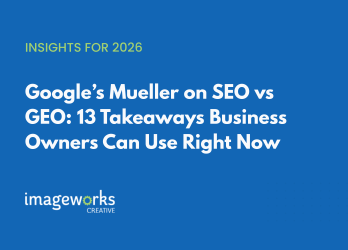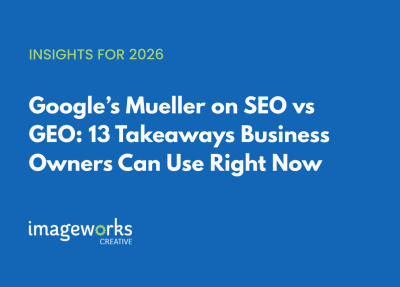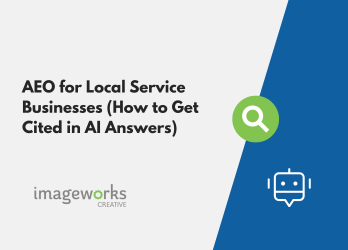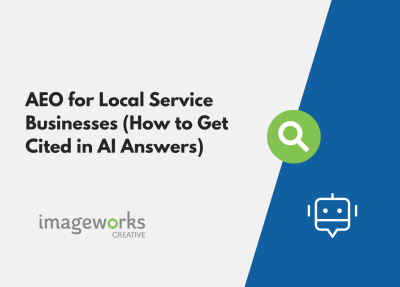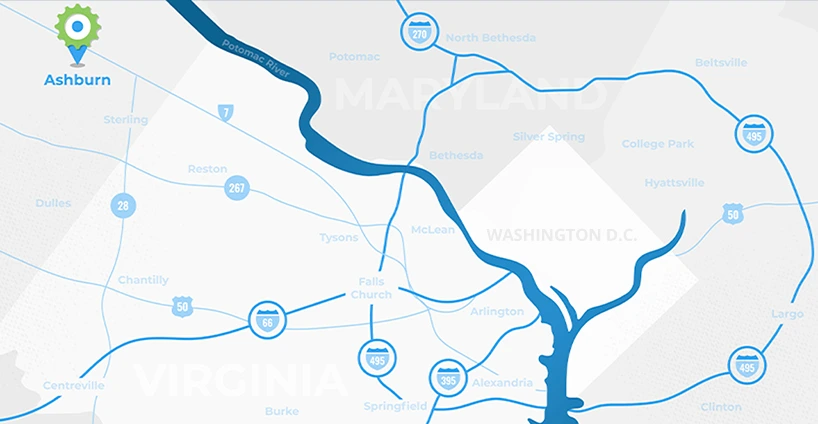LLM SEO Explained: How AI Optimization Lifts Rankings and Conversions
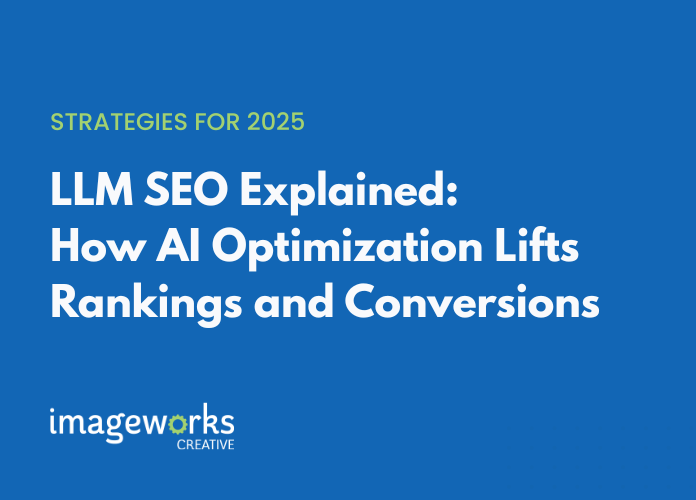
AI SEO is the practice of optimizing content so AI systems like Google’s AI Overviews and ChatGPT can understand, cite, and recommend your site. The payoff is big. AI optimization improves rankings in organic search, increases visibility inside AI answers, and drives more conversions by building trust at the moment of decision. At ImageWorks Creative, we’ve helped businesses adapt to every shift in search since 1997, and LLM SEO is the next step forward.
In this guide, you’ll learn:
- The basics of LLM SEO
- Ways AI boosts your results
- Simple steps to get started
What Is LLM SEO and Why Does It Matter for Modern Search?
LLM SEO means tuning your site so large language models, such as ChatGPT or Google’s AI systems, can easily read, trust, and use your content in their summaries and direct answers. It builds on SEO fundamentals you already know, like clear structure and strong sources, but it applies them in a way AI can reuse.
Traditional SEO aims to rank webpages for keywords. LLM SEO aims to get your content cited inside AI outputs. That includes Google AI Overviews, ChatGPT responses, Gemini, and more. As more people ask AI tools for help, your content must be machine-readable, accurate, and clearly sourced, or you risk being left out.
Why this matters now:
- People are using AI to research purchases, compare options, and get fast answers. Many users never click through to a site if the AI answer satisfies their need.
- AI systems look for clarity, structure, E-E-A-T signals, and up-to-date information. If your content checks these boxes, you show up more often and win more trust.
- Small to large businesses that want to appear in both organic Google results and AI responses need a plan for how to use AI for SEO and where AI SEO services fit.
Key differences from traditional SEO:
- Visibility is measured in citations and mentions inside AI results, not just rankings and clicks.
- Semantic understanding, entities, and context matter more than exact-match keywords.
- Structured formats like FAQs, lists, and tables help AI extract answers cleanly.
- Clear sourcing and credibility signals improve your odds of being included.
For a deeper comparison of search behaviors in AI tools, review credible breakdowns of Google AI vs. ChatGPT differences to see how each system selects and ranks sources.
Key Differences Between Traditional SEO and LLM SEO
- Goal: Traditional SEO ranks pages on SERPs. AI SEO gets your content cited in AI summaries that may appear before the SERPs or alongside them.
- Signals: Traditional SEO leans on backlinks and CTR. LLM SEO rewards semantic clarity, entity recognition (your brand, products, people), and structured data.
- Format: Traditional SEO supports long-form depth. LLM SEO needs scannable sections, headings, and FAQs so models can lift accurate snippets.
- Example: A page with clear H1s, H2s, short paragraphs, and an FAQ about pricing gives AI an easy snippet to cite. A wall of text, even if detailed, is harder for models to parse.
The Rise of AI in Search and Its Impact on Businesses
AI tools now handle conversational questions and return direct answers, often with citations. That shifts discovery. When a trusted AI names your brand first, users act faster. This helps conversions because AI answers often reduce friction and confusion.
As an agency working with search since 1997, we’ve seen this before. When mobile search surged, brands that adapted early won big. The same pattern is unfolding with AI optimization. Make your content easy for AI to reuse, and you gain more qualified visitors who are ready to engage. For a solid primer on trends and tactics, see guides from established experts covering LLM SEO and AI Overviews so you can act with confidence.
How AI Optimization Supercharges Your SEO and Drives Conversions
AI SEO makes your content more discoverable, aligns it with real user intent, and increases conversions by placing your brand inside trusted AI answers. When an AI tool cites your product page, case study, or guide, users see you as a credible option and move forward sooner.
Here are four ways AI optimization helps:
- Improves search visibility
Clear structure, schema markup, and accurate sourcing help AI systems interpret your content. When models can extract answers, your content shows up more often in AI Overviews and conversational outputs. - Raises content quality signals
LLMs favor pages with strong E-E-A-T, fresh data, and transparent citations. Write with a conversational tone, keep stats current, and cite reputable sources. This raises your authority in both standard search and AI answers. - Matches intent better than keywords alone
Semantic targeting aligns your page to what people mean, not just what they type. This helps you rank for longer phrases and get cited in context-rich queries, which improves qualified traffic. - Accelerates trust and conversions
When AI recommends your brand by name, users are primed to act. Expect stronger lead quality from organic AI traffic, higher engagement, and shorter paths to conversion.
If you want a seasoned partner, consider an AI SEO agency with a long track record. Agencies like ours bring technical depth, strategy, and creative support that solo freelancers on platforms like Upwork or Fiverr often cannot match. You get stable talent, proven processes, and continuity from a team that has done this at scale since 1997.
Strategies to Optimize Content for AI Systems
- Write for people and machines: Use short paragraphs, descriptive headings, and plain language.
- Focus on entities: Use consistent names for your brand, products, and experts so AI can associate and cite correctly.
- Add FAQs and key takeaways: These provide pre-built snippets models love to quote.
- Support E-E-A-T: Add author bios, cite trusted sources, and show real-world proof, such as case studies or reviews.
- Use structured data: Add schema for products, articles, FAQs, and how-tos so models can parse your information cleanly.
Example: A service page with “What’s included,” “Pricing FAQs,” and “Who we help” sections gives AI clean answers to quote in summaries.
Measuring Success: SEO Metrics in the AI Era
Track the full picture, not just keyword positions:
- AI mentions and citations: Document when AI tools cite your brand or content.
- Traffic from organic and AI referrals: Use analytics to see session growth and behavior.
- Conversion rates and pipeline impact: Watch demo requests, calls, and form fills tied to organic and AI-assisted sessions.
- Content vitality signals: Monitor engagement, time on page, and scroll depth for pages you optimize.
We provide AI SEO services that include measurement and ROI tracking, so you can see which content gets cited, which pages drive leads, and where to invest next.
Steps to Implement LLM SEO and Get AI-Ready Today
- Audit your content for clarity and trust
Remove fluff, shorten paragraphs, and tighten headings. Add author names, sources, and dates. Update outdated stats. Aim for scannable content that answers questions directly. - Add structured data and fix technical gaps
Use schema for articles, FAQs, products, events, and organization details. Improve mobile speed and Core Web Vitals. Make sure robots.txt and sitemaps are clean so AI crawlers can access key pages. - Build topical authority
Publish content clusters around your core services. Cover definitions, comparisons, FAQs, and step-by-step guides. Link pages together so both search engines and AI models understand your depth and expertise. - Publish across multiple formats
Post text, short videos, and visuals that explain complex topics. AI systems often pull from video transcripts and captions, so repurpose content across formats to increase discoverability. - Add FAQs and summaries to top pages
Start with your highest-traffic landing pages and blog posts. Add a short summary and an FAQ to each. This creates ready-to-quote answers for AI. - Monitor AI visibility and conversions
Track mentions, assisted traffic, and lead quality from organic and AI sources. Mark which pages get cited most and apply those patterns across your site. - Partner with a proven ai seo agency
Getting technical setup, content, and measurement right takes strategy and experience. Agencies with deep SEO roots and AI expertise bring cross-functional skills that freelancers often lack. If you want consistent results, skip the churn and work with a stable team. Review our portfolio of successful SEO projects to see what long-term, strategic work looks like at scale.
Common Pitfalls to Avoid in AI Optimization
- Writing for bots instead of people: Keep it helpful, plain, and readable.
- Ignoring speed and mobile: Slow sites lose both rankings and AI trust.
- Thin or outdated content: Update data, add sources, and expand answers.
- Keyword stuffing: Target intent and entities, not awkward exact matches.
Conclusion
LLM SEO is a practical way to align your site with how people search now. With smart AI optimization, your pages appear in organic results and inside AI answers, which builds trust and speeds up conversions. The core is simple: write clearly, structure content for easy reuse, and back claims with credible sources.
If you want a partner who has adapted to every shift in search since 1997, we’re here to help. Book a call at imageworkscreative.com and let’s map your AI SEO plan.





